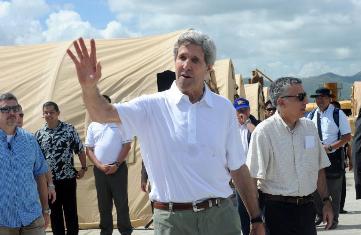US ambassador meets with S. Sudan president over ongoing internal strife
December 18, 2013 (WASHINGTON) – The US state department announced that its ambassador, Susan Page, met with South Sudanese president Salva Kiir in Juba on Wednesday amid fears of civil war in the world’s newest nation.

“She (Page) raised the arrests of several opposition members and called on the government to ensure their rights are protected in accordance with South Sudan’s constitution and international humanitarian and human rights laws and norms”, Harf said.
Clashes erupted over the weekend in Juba between units of the presidential guards from the rival Dinka and Nuer tribes. The fighting spread throughout the capital, leading to the deaths of at least 500 people, with more hundreds injured.
The violence has forced about 20,000 people to seek refuge at UN facilities in Juba since Sunday.
In a TV appearance on Monday, Kiir accused his former deputy, Riek Machar, of staging a coup attempt, along with other prominent South Sudanese officials from the ruling Sudan People’s Liberation Movement (SPLM).
The South Sudan government announced on Tuesday that it had arrested 10 former officials, including former ministers, and that it seeking the arrest of Machar, as well as suspended SPLM secretary-general Pagan Amum, former Unity governor Taban Deng and other ex-ministers.
In an interview with Sudan Tribune, Machar denied planning a coup, accusing Kiir of using the clashes to get rid of his political opponents.
On Wednesday, South Sudan’s army (SPLA) acknowledged that some of its units in Jonglei state had defected and managed to take over the state capital of Bor.
The US has urged all its citizens to depart and suspended embassy operations in Juba.
The US said that it has evacuated three groups of US citizens from Juba, using two department of defence C-130 aircraft and a private charter flight.
US secretary of state John Kerry said that his country “believes very strongly that all parties should refrain from any actions that could further escalate the tensions”.
“Political differences need to be resolved by peaceful and democratic means, and those have been hard fought for. The government should respect the rule of law, and the people of South Sudan should be able to realise their full potential in peace”, Kerry told reporters from the Philippines on Wednesday.
In Washington, the Enough Project published a memo it sent to senior US officials, calling for US intervention to avoid further escalation in the situation.
The advocacy groups has urged the Obama administration to dispatch its special envoy to the Sudans, Donald Booth, to jumpstart mediation efforts and press for unrestricted humanitarian access.
It has also called on the UN Security Council (UNSC) to draft a resolution on the crisis, directing the UN mission to create safe havens and take other visible steps towards civilian protection, as well as push for assurances of due process and humane treatment for all political detainees and their ultimate release to join peace efforts.
The Enough Project’s Sudan policy analyst, Akshaya Kumar, warned that with reports of Nuer tribe members being targeted, the risk of “violent ethnic polarisation” remained real
“South Sudan’s people suffered decades of deadly civil war already, they deserve an engaged international community to help avert another return to violence”, she said.
“Now that president Kiir has offered to sit down with Riek Machar to discuss their differences, the international community needs to double down on diplomatic engagement to facilitate a political resolution to the crisis”.
(ST)
Related articles:
- ST – South Sudan crisis
- ST – South Sudan army says General Peter Gadet has defected from SPLA
- S. Sudan’s Kiir says ready for dialogue with Machar
- ST – Mutinying soldiers kill 20 people in Bor as unrest worsens
- ST – Calm returns to Juba after days of political unrest
- ST – Former SPLM secretary-general Amum arrested in Juba
- ST – Ugandans, Kenyans evacuated from South Sudan
